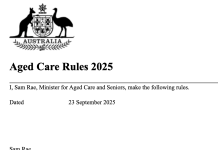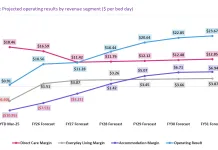The first national study to examine psychotropic medication use in aged care since landmark reforms has revealed that residents with dementia are still prescribed antipsychotics at twice the rate of those without the condition.
Researchers from Macquarie University’s Australian Institute of Health Innovation analysed data from 2018 to 2022, covering nearly 38,000 residents across 428 aged care facilities. The study, led by Associate Professor Magda Raban, found encouraging declines in the use of antipsychotics, sedatives and antiseizure medications among residents both with and without dementia.
Among residents with dementia, antipsychotic use dropped from 32.6% to 22.7%, sedatives from 23.6% to 14.9%, and antiseizure medications from 19.1% to 14.2%. Similar trends were observed among those without dementia.
“We wanted to understand whether recent aged care reforms, particularly those following the 2018 Royal Commission, had influenced the use of psychotropic medications in residential aged care,” Associate Professor Magda Raban says.
Despite progress, the study highlighted ongoing concerns. Antipsychotic prescribing remained twice as high in residents with dementia (23%) compared with those without (11%). Meanwhile, antidepressant use among people with dementia rose from 42% in 2018 to 48% in 2022, with no sign of decline.
Associate Professor Raban says that this may suggest a shift away from antipsychotics towards antidepressants, which are possibly perceived as a safer alternative.
“However, antidepressants also have side effects and limited evidence of benefit for behavioural symptoms, including depression, in dementia,” she added.
The researchers stressed that psychotropic drugs should only be used as a last resort, and for the shortest possible time, when other approaches fail.











